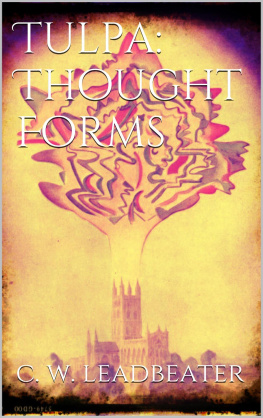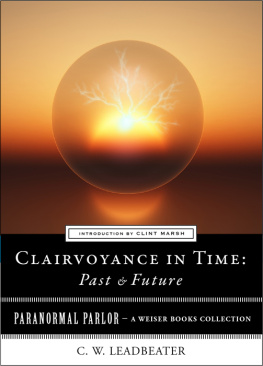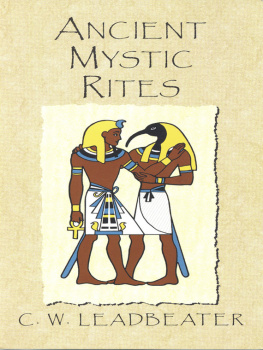INVISIBLE HELPERS
C. W. LEADBEATER

This 2012 edition published by Barnes & Noble, Inc.
All rights reserved. No part of this publication may be reproduced, stored in a retrieval system, or transmitted, in any form or by any means, electronic, mechanical, photocopying, recording, or otherwise, without prior written permission from the publisher.
Barnes & Noble, Inc.
122 Fifth Avenue
New York, NY 10011
ISBN: 978-1-4114-6524-4
CHAPTER I
T HE U NIVERSAL B ELIEF IN T HEM
I T is one of the most beautiful characteristics of Theosophy that it gives back to people in a more rational form everything which was really useful and helpful to them in the religions which they have outgrown. Many who have broken through the chrysalis of blind faith, and mounted on the wings of reason and intuition to the freer, nobler mental life of more exalted levels, nevertheless feel that in the process of this glorious gain a something has been lostthat in giving up the beliefs of their childhood they have also cast aside much of the beauty and the poetry of life.
If, however, their lives in the past have been sufficiently good to earn for them the opportunity of coming under the benign influence of Theosophy, they very soon discover that even in this particular there has been no loss at all, but an exceeding great gainthat the glory and the beauty and the poetry are there in fuller measure than they had ever hoped before, and no longer as a mere pleasant dream from which the cold light of common-sense may at any time rudely awaken them, but as truths of nature which will bear investigationwhich become only brighter, fuller and more perfect as they are more accurately understood.
A marked instance of this beneficent action of Theosophy is the way in which the invisible world (which, before the great wave of materialism engulfed us, used to be regarded as the source of all living help) has been restored by it to modern life. All the charming folk-lore of the elf, the brownie and the gnome, of the spirits of air and water, of the forest, the mountain and the mine, is shown by it to be no more meaningless superstition, but to have a basis of actual and scientific fact behind it. Its answer to the great fundamental question "If a man die, shall he live again?" is equally definite and scientific, and its teaching on the nature and conditions of the life after death throws a flood of light upon much that, for the Western world at least, was previously wrapped in impenetrable darkness.
It cannot be too often repeated that in this teaching as to the immortality of the soul and the life after death, Theosophy stands in a position totally different from that of ordinary religion. It does not put forward these great truths merely on the authority of some sacred book of long ago; in speaking of these subjects it is not dealing with pious opinions, or metaphysical speculations, but with solid, definite facts, as real and as close to us as the air we breathe or the houses we live infacts of which many among us have constant experiencefacts among which lies the daily work of some of our students, as will presently be seen.
Among the beautiful conceptions which Theosophy has restored to us stands preeminent that of the great helpful agencies of nature. The belief in these has been world-wide from the earliest dawn of history, and is universal even now outside the narrow domains of protestantism, which has emptied and darkened the world for its votaries by its attempt to do away with the natural and perfectly true idea of intermediate agents, and reduce everything to the two factors of man and deitya device whereby the conception of deity has been infinitely degraded, and man has remained unhelped.
A moment's thought will show that the ordinary view of providencethe conception of an erratic interference by the central power of the universe with the result of his own decreeswould imply the introduction of partiality into the scheme, and therefore of the whole train of evils which must necessarily follow upon its heels. The Theosophical teaching, that a man can be thus specially helped only when his past actions have been such as to deserve this assistance, and that even then the help will be given through those who are comparatively near his own level, is free from this serious objection; and it furthermore brings back to us the older and far grander conception of an unbroken ladder of living beings extending down from the Logos Himself to the very dust beneath our feet.
In the East the existence of the invisible helpers has always been recognized, though the names given and the characteristics attributed to them naturally vary in different countries; and even in Europe we have had the old Greek stories of the constant interference of the gods in human affairs, and the Roman legend that Castor and Pollux led the legions of the infant republic in the battle of Lake Regillus. Nor did such a conception die out when the classical period ended, for these stories have their legitimate successors in medival tales of saints who appeared at critical moments and turned the fortune of war in favour of the Christian hosts, or of guardian angels who sometimes stepped in and saved a pious traveller from what would otherwise have been certain destruction.
CHAPTER II
S OME M ODERN I NSTANCES
E VEN in this incredulous age, and amidst the full whirl of our nineteenth-century civilization, in spite of the dogmatism of our science and the deadly dullness of our protestantism, instances of intervention inexplicable from the materialistic standpoint may still be found by anyone who will take the trouble to look for them; and in order to demonstrate this to the reader I will briefly epitomize a few of the examples given in one or other of the recent collections of such stories, adding thereto one or two that have come within my own notice.
One very remarkable feature of these more recent examples is that the intervention seems nearly always to have been directed towards the helping or saving of children.
An interesting case which occurred in London only a few years ago was connected with the preservation of a child's life in the midst of a terrible fire, which broke out in a street near Holborn, and entirely destroyed two of the houses there. The flames had obtained such hold before they were discovered that the firemen were unable to save the houses, but they succeeded in rescuing all the inmates except twoan old woman who was suffocated by the smoke before they could reach her, and a child about five years old, whose presence in the house had been forgotton in the hurry and excitement of the moment.
The mother of the child, it seems, was a friend or relative of the landlady of the house, and had left the little creature in her charge for the night, because she was herself obliged to go down to Colchester on business. It was not until everyone else had been rescued, and the whole house was wrapped in flame, that the landlady remembered with a terrible pang the trust that had been confided to her. It seemed hopeless then to attempt to get at the garret where the child had been put to bed, but one of the firemen heroically resolved to make the desperate effort, and, after receiving minute directions as to the exact situation of the room, plunged in among the smoke and flame.
He found the child, and brought him forth entirely unharmed; but when he rejoined his comrades he had a very singular story to tell. He declared that when he reached the room he found it in flames, and most of the floor already fallen; but the fire had curved round the room towards the window in an unnatural and unaccountable manner, the like of which in all his experience he had never seen before, so that the corner in which the child lay was wholly untouched, although the very rafters of the fragment of floor on which his little crib stood were half burnt away. The child was naturally very much terrified, but the fireman distinctly and repeatedly declared that as at great risk he made his way towards him he saw a form like an angelhere his exact words are givena something "all gloriously white and silvery, bending over the bed and smoothing down the counterpane." He could not possibly have been mistaken about it, he said, for it was visible in a glare of light for some moments, and in fact disappeared only when he was within a few feet of it.














